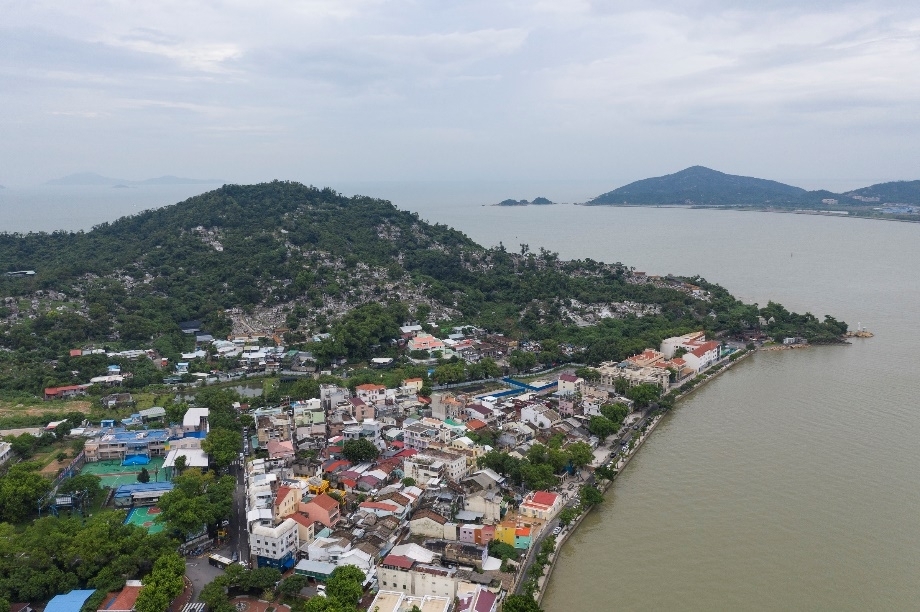MUST has been approved to build the first National Field Science Observation and Research Station outside China - National Observation and Research Station of Coastal Ecological Environments in Macao
21/10/2021
21/10/2021
On 11th October 2021, the Ministry of Science and Technology of the People’s Republic of China issued a notice on the approval of the construction of 69 national field science observation and research stations (Guo Ke Fa Ji [2021] No. 295). The National Observation and Research Station of Coastal Ecological Environments in Macao (“Macao Field Station” for short), as China’s first and only national field science observation and research station outside the country, was officially approved for construction.

MUST has been approved to build the first National Field Science Observation and Research Station outside China
According to the construction plan, the Macao Field Station will be built into a three-dimensional observation platform integrating the sky, the land and the sea for the ecological environment of the coastal zone, which will fill the gap in the comprehensive science observation of China's subtropical coastal ecosystem. The National Field Science Observation and Research Station, the National Laboratory, and the State Key Laboratory are equally important national scientific and technological innovation bases as well as an integral part of the national innovation system.
Application for the construction of the Macau Field Station was started by the MUST in June 2019 in accordance with the “Construction and Development Plan for National Field Science Observation and Research Station (2019-2025)” formulated and released by the Ministry of Science and Technology (MOST) together with the Ministry of Finance (MOF) of the People’s Republic of China. With the strong support of the Macao SAR government, the Macao Environmental Protection Bureau (DSPA) and the Macao Science and Technology Development Fund (FDCT), the Macao Field Station was officially approved by the MOST on 9th October 2021, with DSPA as the competent unit and the MUST as the supporting unit for construction. The approval of the construction of the Macao Field Station is a technical requirement of construction of a world-class Bay Area as well as an important manifestation of Macao's full integration into the national scientific and technological innovation system.
Through the construction of the Macao Field Station, MUST will carry out closer cooperation with Tsinghua University, Peking University (PKU), Chinese Academy of Sciences (CAS), China Institute of Water Resources and Hydropower Research (IWHR), Guangdong University of Technology (GDUT), Sun Yat-sen University (SYSU), Jinan University (JNU), Hong Kong University of Science and Technology (HKUST) and Chinese University of Hong Kong (CUHK) in relevant fields including scientific observation, joint research and talent cultivation in the future, which will significantly enhance MUST’s research capabilities in the fields of coordinated control of multiple pollutants, coordinated regional governance, and ecological restoration under the background of ecological environment and climate change. The cooperation between MUST and other institutions will also facilitate Macao's environmental protection and pollution prevention through scientific and technological innovation, providing strong support for solving ecological and environmental problems such as air pollution, water pollution and coastal degradation in the Greater Bay Area, as well as for green sustainable restoration and ecological risk management and control.
In addition, the Macao Field Station will actively promote interdisciplinary and carry out key and forward-looking basic and applied basic research, enabling the coordinated control of atmospheric ozone and fine particulate matter in Macao and the effective improvement of nearshore water environmental quality. Moreover, it also provides scientific basis and technical support for the Guangdong, Hong Kong and Macao governments to achieve coordinated control of multiple pollutants, coordinated regional governance, and continuous improvement of environmental quality under the background of climate change, and jointly enhance the overall environmental quality of the Greater Bay Area so that it will be up to the standard of an international first-class bay area.
Reprinted from MUST: https://www.must.edu.mo/news/40817-article10151620
Application for the construction of the Macau Field Station was started by the MUST in June 2019 in accordance with the “Construction and Development Plan for National Field Science Observation and Research Station (2019-2025)” formulated and released by the Ministry of Science and Technology (MOST) together with the Ministry of Finance (MOF) of the People’s Republic of China. With the strong support of the Macao SAR government, the Macao Environmental Protection Bureau (DSPA) and the Macao Science and Technology Development Fund (FDCT), the Macao Field Station was officially approved by the MOST on 9th October 2021, with DSPA as the competent unit and the MUST as the supporting unit for construction. The approval of the construction of the Macao Field Station is a technical requirement of construction of a world-class Bay Area as well as an important manifestation of Macao's full integration into the national scientific and technological innovation system.
Through the construction of the Macao Field Station, MUST will carry out closer cooperation with Tsinghua University, Peking University (PKU), Chinese Academy of Sciences (CAS), China Institute of Water Resources and Hydropower Research (IWHR), Guangdong University of Technology (GDUT), Sun Yat-sen University (SYSU), Jinan University (JNU), Hong Kong University of Science and Technology (HKUST) and Chinese University of Hong Kong (CUHK) in relevant fields including scientific observation, joint research and talent cultivation in the future, which will significantly enhance MUST’s research capabilities in the fields of coordinated control of multiple pollutants, coordinated regional governance, and ecological restoration under the background of ecological environment and climate change. The cooperation between MUST and other institutions will also facilitate Macao's environmental protection and pollution prevention through scientific and technological innovation, providing strong support for solving ecological and environmental problems such as air pollution, water pollution and coastal degradation in the Greater Bay Area, as well as for green sustainable restoration and ecological risk management and control.
In addition, the Macao Field Station will actively promote interdisciplinary and carry out key and forward-looking basic and applied basic research, enabling the coordinated control of atmospheric ozone and fine particulate matter in Macao and the effective improvement of nearshore water environmental quality. Moreover, it also provides scientific basis and technical support for the Guangdong, Hong Kong and Macao governments to achieve coordinated control of multiple pollutants, coordinated regional governance, and continuous improvement of environmental quality under the background of climate change, and jointly enhance the overall environmental quality of the Greater Bay Area so that it will be up to the standard of an international first-class bay area.
Reprinted from MUST: https://www.must.edu.mo/news/40817-article10151620

Office address: Avenida do Infante D. Henrique, No. 43-53A, Macau Square, 8th Floor, Unit C and 11th Floor, Unit K, Macao (To apply for project funding, please go to 11th Floor, Unit K)
Office hours: Monday to Thursday: 9:00-13:00, 14:30-17:45;Friday: 9:00-13:00, 14:30-17:30;Tel.: 28788777
Copyright(C) 2021 ALL right reserved.
Office hours: Monday to Thursday: 9:00-13:00, 14:30-17:45;Friday: 9:00-13:00, 14:30-17:30;Tel.: 28788777
Copyright(C) 2021 ALL right reserved.

